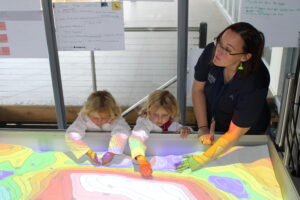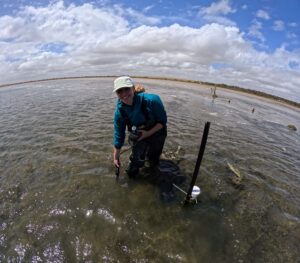More than 6500 hectares of sea grass have been lost along Adelaide’s coastal waters since 1949. Sea grasses provide vital habitat and nursery grounds for many marine animals, help to stabilise the sea floor and also sequester significant amounts of carbon. Human pollution is the biggest cause of seagrass decline, particularly high levels of plant nutrients and fine sediments from agricultural and urban runoff. For Gulf St Vincent, significant improvements in nutrient run-off have been made in recent years, but suspended fine sediments still pose a threat to sea grass communities. Suspended sediments reduce light penetration into the water which can reduce seagrass growth, can kill whole populations and also prevent seagrass colonisation of otherwise suitable habitat.
The South Australian Government, through its New Life for our Coastal Environment policy has committed $1 million to limit damaging stormwater run-off filled with sediment and pollutants from entering Gulf St Vincent and help restore seagrass communities. The Goyder Institute for Water Research is assisting in the commitment. The Institute and the Department for Environment and Water brought together researchers and managers to collate current knowledge and identify key knowledge gaps. These workshop included experts from Institute Partners (DEW, CSIRO, Flinders University, SARDI, The University of Adelaide, The University of South Australia), and natural resources managers from the Cities of Salisbury, Marion, Onkaparinga, Mitcham, Holdfast Bay, SA Water, the Department for Environment and Water, Water Sensitive SA and the EPA.
The workshops identified fine sediments as a critical factor limiting sea grass restoration in Gulf St Vincent and highlighted the need for future research to focus on where sediments are coming from, and what types of management interventions can best reduce fine sediment discharge into the Gulf. As a result a decision framework for selecting stormwater management interventions to reduce fine sediments and improve coastal water quality is being developed by the Goyder Institute as part of a new project co-funded by DEW- A decision framework for selecting stormwater management interventions to reduce fine sediments and improve coastal water quality. The longer-term knowledge gaps identified through the workshops and the short-term project will be used by the Institute as a basis for identifying future research opportunities with stakeholders.
A project team, led by Dr Baden Myers, University of South Australia, with collaborators from the University of South Australia, Flinders University, SA Water, and the University of Adelaide will develop the decision support framework including consideration of:
- the effectiveness of different interventions, with a focus on known interventions rather than new interventions
- existing information on sources of fine sediment to the Gulf
- application of a criteria assessment approach
- opportunities for co-investment across local and state government.
The framework will be tested and applied at a sub-catchment scale in the first instance but have capacity to be applied to all metropolitan Adelaide catchments in the future. The framework will be developed by May 2020 to inform the New Life for our Coastal Environment policy.
This project builds on the urban water research capacity developed at the Institute since its inception in 2010, and in particular the existing catchment data and modelling work that targeted stormwater interventions across the Adelaide metropolitan catchment with Institute partners and collaborators (SA Water, CSIRO, SA EPA, Deltares, NRM Board, and Flinders University). Both projects are an example of the Institute’s collaborative approach to research and its capacity to provide independent, high quality advice to inform policy.
Contact Goyder Institute Director Dr Kane Aldridge for more information about the project and the Institute’s urban water research capability.


